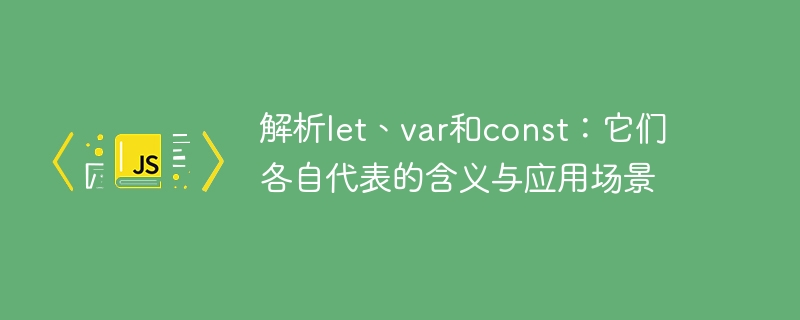

Analysis of let, var and const: their respective meanings and application scenarios require specific code examples
In JavaScript, we often use let, var and const to declare variables. These three keywords represent different variable declaration methods and scoping rules. This article will analyze the meaning of let, var and const, and illustrate their application in different scenarios.
The sample code is as follows:
function example() {
let x = 10;
if (true) {
let x = 20;
console.log(x); // 输出 20
}
console.log(x); // 输出 10
}
example();In the above example, we used two different let in the function example Declared variable x. The x redeclared in the if statement block is only valid within the block, while the x inside the function is not affected.
The sample code is as follows:
function example() {
var x = 10;
if (true) {
var x = 20;
console.log(x); // 输出 20
}
console.log(x); // 输出 20
}
example();In the above example, we also used two different var# within the if statement block ##Declared variablesx. Since the variable declaration of var will be promoted to the top of the function, the console.log(x) output outside the if statement block is the value 20 after reassignment within the block.
function example() {
const x = 10;
if (true) {
const x = 20;
console.log(x); // 输出 20
}
console.log(x); // 输出 10
}
example();constdeclared constantsx . Although the constant x is redeclared within the block, since the constant value declared as const cannot be modified, the constant redeclared within the block is only valid within the block and cannot affect external constants x.
The above is the detailed content of Compare let, var and const: their meaning and scope of application. For more information, please follow other related articles on the PHP Chinese website!
 What is digital currency
What is digital currency
 How to open ESP files
How to open ESP files
 How to turn off real-time protection in Windows Security Center
How to turn off real-time protection in Windows Security Center
 What are the new features of Hongmeng OS 3.0?
What are the new features of Hongmeng OS 3.0?
 How to unlock oppo phone if I forgot password
How to unlock oppo phone if I forgot password
 How to solve the problem that localhost cannot be opened
How to solve the problem that localhost cannot be opened
 MySQL creates stored procedure
MySQL creates stored procedure
 How to buy and sell Bitcoin? Bitcoin Trading Tutorial
How to buy and sell Bitcoin? Bitcoin Trading Tutorial




